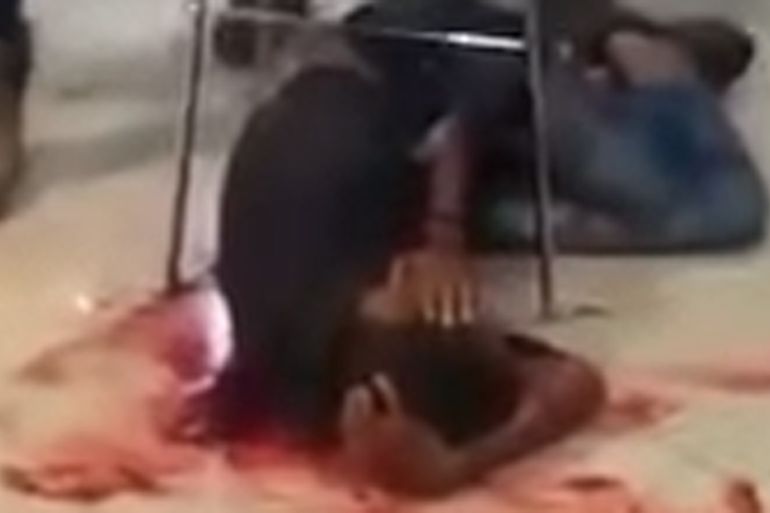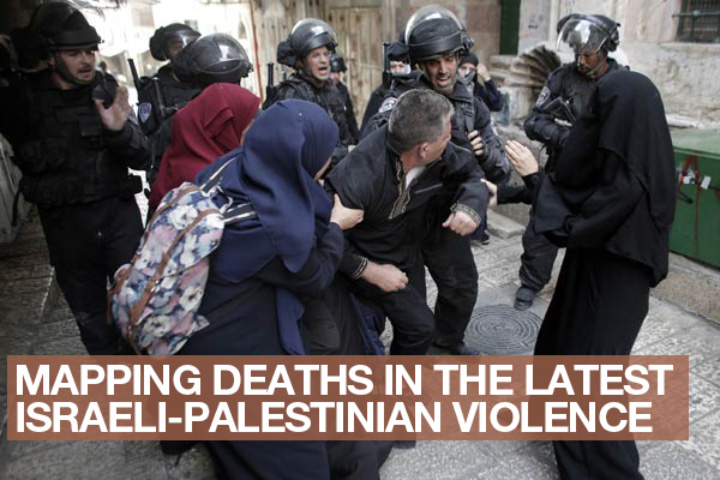Israel mob lynches Eritrean after bus station attack
Asylum seeker shot by security guard and beaten by bystanders after deadly shooting in Beersheba.

An Eritrean man has died after he was shot and beaten by a mob after he was mistaken for an attacker during a raid in southern Israel, Israeli police say.
The attack on Sunday night at a bus station in the city of Beersheba saw a Palestinian man armed with a rifle and a knife kill an Israeli soldier and wound about 10 other people.
Keep reading
list of 4 itemsTimeline of Iran-Israel escalation since the war on Gaza began
Russia-Ukraine war: List of key events, day 785
The Take: After Iran struck Israel, how did Jordan and Lebanon react?
The Palestinian attacker was killed, while a security guard shot the Eritrean bystander, identified by Israeli media as 29-year-old Haftom Zarhum, thinking he was an accomplice of the assailant.
A video circulating online (WARNING – graphic footage) shows that a mob also beat Zarhum, who later died in hospital.
At least one Israeli soldier was filmed kicking Zarhum in the head as he lay bleeding on the floor of the terminal. Another man lifted a bench and dropped it on Zarhum’s head as others tried to protect him by placing a bar stool over his body.
Speaking to Al Jazeera, Israeli police spokesman Micky Rosenfeld confirmed Zarhum was “misidentified”.
“The man was hit by bystanders and individual civilians who were in the area. Police are looking into it now and have obtained the CCTV footage of the incident.”
The Israeli IBA network posted footage of the attack, purportedly recorded by a surveillance camera.
|
|
| Israel to widen police stop-and-frisk powers |
Rosenfeld said the “Palestinian attacker stabbed a soldier and stole his M-16 rifle,” opening fire on the crowd at the bus terminal. The soldier died in hospital.
The attacker was named by police as Muhand Alukabi, 21, a resident of Hura in the Negev.
READ MORE: Palestinians clash with Israeli forces across West Bank
“The death of an asylum seeker at the hands of security guards and an angry mob is a tragic but foreseeable outgrowth of a climate in which some Israeli politicians encourage citizens to take the law into their own hands,” said Sari Bashi, Israel-Palestine country director at Human Rights Watch. “The Israeli authorities should investigate and prosecute those responsible for the attack. Israel faces acute threats to public safety, but vigilantism will only lead to more innocent people being harmed or killed.”

Triggered by Israeli incursions into the Al-Aqsa Mosque compound last month, violence and protests against Israel’s occupation have increased in frequency across the West Bank, including East Jerusalem, and the Gaza Strip.
Diplomatic moves to halt the more than two weeks of unrelenting violence has gained steam, with US Secretary of State John Kerry saying he plans to meet both the Israeli and Palestinian leaders in the coming days.
Israeli Prime Minister Benjamin Netanyahu, meanwhile, rejected an idea from France that would see international observers sent to the Al-Aqsa Mosque compound.
Israeli forces have responded to the unrest with a crackdown on protesters, using tear gas, stun grenades, rubber-coated steel bullets and live ammunition.

Sunday’s attack brings the total number of Palestinians killed since the beginning of the month to 44. Eight Israelis have been killed.
Checkpoints have been set up in the occupied East Jerusalem, where some of the attackers have come from, and about 300 soldiers on Sunday began reinforcing the police force.
African asylum seekers in Israel have long been the target of political incitement and discriminatory legislation.
In July, an Israeli court approved the deportation of refugees to countries such as Rwanda and Uganda, and gave a stamp of approval to the indefinite detention of asylum seekers who refuse deportation.
Israeli Culture Minister Miri Regev, a member of Netanyahu’s hardline Likud party, has in the past called African asylum seekers a “cancer in Israel’s body”.
Residences and schools servicing asylum seekers have also been targeted in attacks, including with firebombs, in recent years.